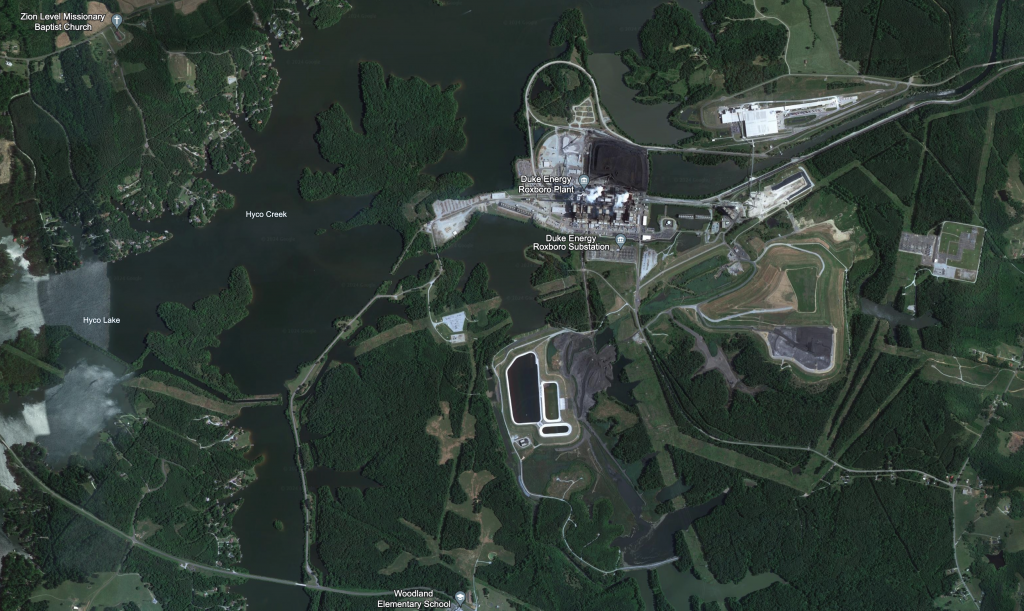Duke Energy’s proposal to convert the Roxboro coal plant to gas would be one of many dangerous new fossil fuel investments

Community members from Person County and beyond have mobilized to fight the Moriah Energy Center under the banner of “NoMEC,” a project of the nonprofit Person County Community Action Network, known as PC-CAN. For more information, visit NoMEC.org and check out this video.
Amid an alarming set of proposals for an extensive methane gas expansion across North Carolina, Duke Energy wants to convert its coal-fired power plant on Hyco Lake in Person County, known as the Roxboro Steam Station, to a combined-cycle methane gas power plant.
- New methane gas plant (Duke Energy): a combined-cycle plant in Person County, proposed because of projected gas from the unfinished Mountain Valley Pipeline, which goes through West Virginia and Virginia.
- MVP Southgate (Equitrans Midstream Partners): an extension of MVP to bring gas from Virginia into North Carolina. Cannot begin construction until it receives permits that it is missing. PSNC Energy (a Dominion Energy subsidiary) and Duke Energy would buy the pipeline’s gas.
- T15 Reliability Project (Dominion Energy): a 45-mile pipeline from Eden (the terminus of the proposed MVP Southgate) to Hyco Lake. Would be used to transport gas to the proposed Roxboro Steam Station conversion.
- Moriah Energy Center (Dominion Energy): a liquified natural gas storage facility on 480 acres of land in southeastern Person County previously zoned as a rural conservation district.
- Transco’s Southeast Supply Enhancement Project (Williams Companies): A nearly 55-mile pipeline through Virginia and North Carolina with additional compressor units to expand existing capacity. This would be the largest pipeline proposed in our region in the last 10 years.
Across North and South Carolina, Duke Energy has called for nearly 9 gigawatts of new gas by 2035 — almost three times the proposed amount in the original Carbon Plan from 2022. Experts say this is one of the largest gas buildouts in the country. Duke Energy claims that its plans help put North Carolina on a path to cleaner energy.
But building the proposed methane gas infrastructure is anything but clean. This gas buildout would pose four main problems by:
- locking in both carbon dioxide and methane emissions for decades
- burdening residential customers with unnecessary costs
- jeopardizing the reliability of our energy system
- posing a threat to public health.
Methane gas is bad for the climate
Methane gas, often misleadingly referred to as “natural gas,” is a fossil fuel largely composed of methane, which is a potent greenhouse gas that contributes to climate change. Though relatively short-lived in the atmosphere, methane is 86 times more potent than carbon dioxide over a 20-year timeframe. Studies indicate that methane gas may contribute to climate change as much as coal due to leaks from venting, drilling, extraction, transportation through pipelines and equipment malfunctions at well pads, valves, compressor stations and storage tanks.
Leaks as low as 0.2% of the U.S. production and supply system equal the level of greenhouse gas emissions from the coal industry. And that 0.2% threshold is regularly surpassed. Studies have found that methane emissions are much higher than reported by the Environmental Protection Agency. Additionally, during one super-emitter event in 2018, an Ohio gas well leaked more methane during one incident than Norway’s entire oil and gas industry does in a year.
Though methane gas emits around half the amount of carbon dioxide as coal when burned, its climate impact is substantial compared to renewable energy sources. Building new methane gas infrastructure would lock in both carbon dioxide and methane emissions for decades to come. Additionally, scientists warn that building more methane gas infrastructure will outweigh ongoing efforts to mitigate climate change in North Carolina. Diminishing the market for methane gas, along with reducing emissions of methane and other potent, short-lived greenhouse gases would slow global warming faster than any other mitigation strategy.

Duke Energy wants to convert its Roxboro Steam Station to burn gas instead of coal. Google Earth
A high price tag
Converting the 2,462-megawatt Roxboro Steam Station to methane gas would come at a high cost, considering Duke Energy’s past coal plant transitions. Duke Energy spent over $150 million in 2021 just to enable 50% methane gas co-firing for two 1,120-megawatt units at the Belews Creek Steam Station. In 2020, Duke closed its Lake Julian coal plant south of Asheville, replacing it with a 560-megawatt gas plant that cost $893 million.
Ratepayers would bear the burden of financing Duke’s proposed gas projects through higher utility bills. Duke’s latest projections indicate rate increases that are 74% higher than previously forecasted for Duke Energy Carolinas’ network, and 39% more for Duke Energy Progress’ network by 2033. This is on top of a 14.6% rate hike across three years that the North Carolina Utilities Commission approved in late 2023. Duke’s methane gas expansion plans will hit residents hard — especially low-income households that tend to spend a higher portion of their income on energy bills — despite its claims that this is the affordable route.
A 2021 North Carolina law requires Duke to cease methane gas operations by 2050 in order to reach carbon neutrality. As such, the utility plans to use the converted Roxboro methane gas plant as a hydrogen plant after 2050, which would cost even more. Duke Energy admits that hydrogen energy is quite speculative and would require technological breakthroughs to burn and transport hydrogen. The technology may never become cost-effective, clean or commercially viable. Given this uncertainty, residential customers may pay a high cost for this proposed conversion that may then never be fully utilized.
The costs of this conversion are especially unnecessary considering how affordable renewable energy sources have become. One study shows that clean, renewable energy sources are cheaper than 99% of proposed gas plants when taking full advantage of the tax credits in the Inflation Reduction Act, and cheaper than 94% even if only claiming a 30% credit. Another report found that Duke could save hundreds of millions of dollars by 2030 if it focused more on solar and battery storage.
Duke stands to gain from its proposed methane gas projects, as it receives higher financial returns on those than solar and battery systems, since it is the sole builder and owner of gas power plants. Meanwhile, Duke must allow third-party developers to build at least 45% of solar infrastructure in North Carolina and then buy the electricity generated from them.
False promises of reliability
 Duke Energy claims that new gas plants are necessary to meet rare spikes in demand while balancing affordability and reliability. But the failure of methane gas plants during Winter Storm Elliot in December 2022 caused Duke to institute rolling blackouts for the first time in North Carolina history, leaving over 500,000 customers without power during freezing temperatures.
Duke Energy claims that new gas plants are necessary to meet rare spikes in demand while balancing affordability and reliability. But the failure of methane gas plants during Winter Storm Elliot in December 2022 caused Duke to institute rolling blackouts for the first time in North Carolina history, leaving over 500,000 customers without power during freezing temperatures.
The first malfunctions in Duke’s network occurred at primarily gas-powered plants. Across the Eastern U.S., methane gas plant failures accounted for 63% of lost power during Winter Storm Elliot, while solar and wind were responsible for only 1% and 4%, respectively. This is not an anomaly — during five recent extreme winter weather events across the past 12 years, gas plants accounted for the majority of failed capacity. Additional solar, battery storage and wind production could have reduced the amount and duration of rolling blackouts.
Reliability claims about methane gas do not match real-world performance. Dependence on gas increases the risk of grid failures when power is needed most, while solar and wind perform well in adverse winter conditions.
Additionally, research indicates that power outages disproportionately harm communities of color, people with disabilities and low-income households. Increasing our reliance on gas by expanding infrastructure would further endanger these communities, leaving them more susceptible to power disruptions during severe weather events.
Harm to public health
Generating electricity from methane gas produces pollutants called nitrogen oxides. Exposure to high concentrations of NOx can cause asthma, respiratory infections and heart damage. Additionally, NOx reacts with other airborne chemicals to form particulate matter and ozone. Ozone exposure can cause various respiratory complications, while particulate matter affects the lungs and the heart, potentially leading to heart attacks, impaired lung function and premature death.
Additionally, methane gas plants require pipelines to transport the gas, which introduce various public health hazards, including the contamination of local drinking water, air pollution, degradation of soil quality resulting in reduced crop yields, and the threat of pipeline explosions and fires. Additionally, hydraulic fracturing, or fracking, is used to extract methane gas. This process also causes air pollution and water contamination, leading to negative health effects. Counties across the U.S. with higher concentrations of socially vulnerable communities (such as Native communities, people of color, rural communities and people with low incomes) have significantly higher pipeline densities than counties with fewer socially vulnerable residents.
Say not to gas expansion
 We all deserve to live in a safe and healthy natural environment. The various proposed methane gas projects in Person County and nearby areas pose a threat to these communities’ welfare. North Carolinians should reject Duke, Dominion Energy and Williams Companies’ proposals and demand a shift to renewable energy over methane gas.
We all deserve to live in a safe and healthy natural environment. The various proposed methane gas projects in Person County and nearby areas pose a threat to these communities’ welfare. North Carolinians should reject Duke, Dominion Energy and Williams Companies’ proposals and demand a shift to renewable energy over methane gas.
Stay tuned for more updates on the proposed methane gas expansion in North Carolina and how you can make your voice heard.
The post Duke Energy’s proposal to convert the Roxboro coal plant to gas would be one of many dangerous new fossil fuel investments appeared first on Appalachian Voices.
Protecting the Central and Southern Appalachian Mountain Region
Source: https://appvoices.org/2024/03/18/roxboro-conversion/
Anyone can join.
Anyone can contribute.
Anyone can become informed about their world.
"United We Stand" Click Here To Create Your Personal Citizen Journalist Account Today, Be Sure To Invite Your Friends.
Please Help Support BeforeitsNews by trying our Natural Health Products below!
Order by Phone at 888-809-8385 or online at https://mitocopper.com M - F 9am to 5pm EST
Order by Phone at 866-388-7003 or online at https://www.herbanomic.com M - F 9am to 5pm EST
Order by Phone at 866-388-7003 or online at https://www.herbanomics.com M - F 9am to 5pm EST
Humic & Fulvic Trace Minerals Complex - Nature's most important supplement! Vivid Dreams again!
HNEX HydroNano EXtracellular Water - Improve immune system health and reduce inflammation.
Ultimate Clinical Potency Curcumin - Natural pain relief, reduce inflammation and so much more.
MitoCopper - Bioavailable Copper destroys pathogens and gives you more energy. (See Blood Video)
Oxy Powder - Natural Colon Cleanser! Cleans out toxic buildup with oxygen!
Nascent Iodine - Promotes detoxification, mental focus and thyroid health.
Smart Meter Cover - Reduces Smart Meter radiation by 96%! (See Video).





